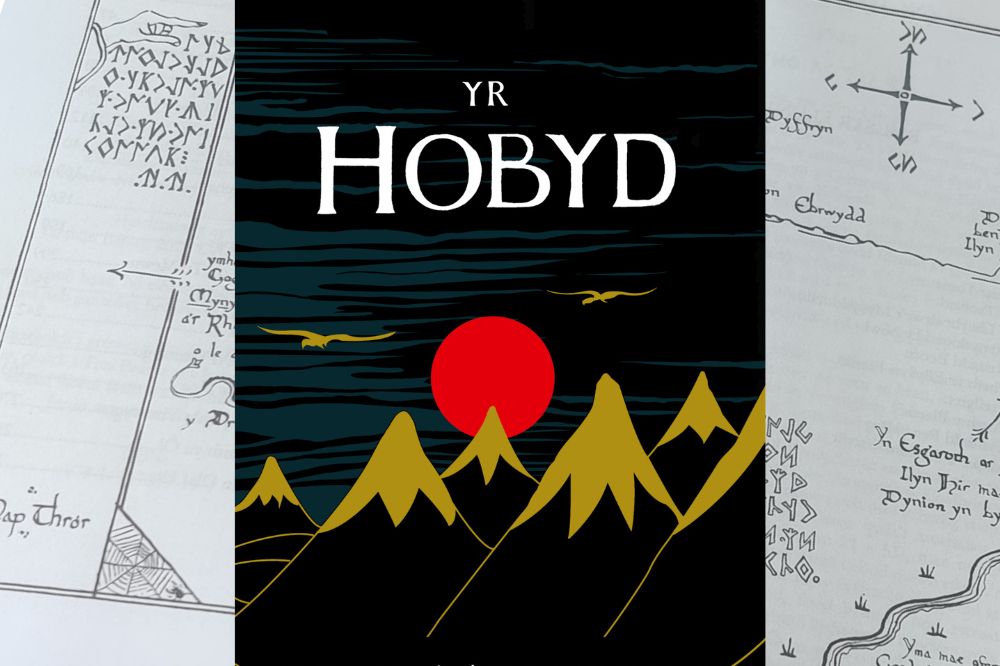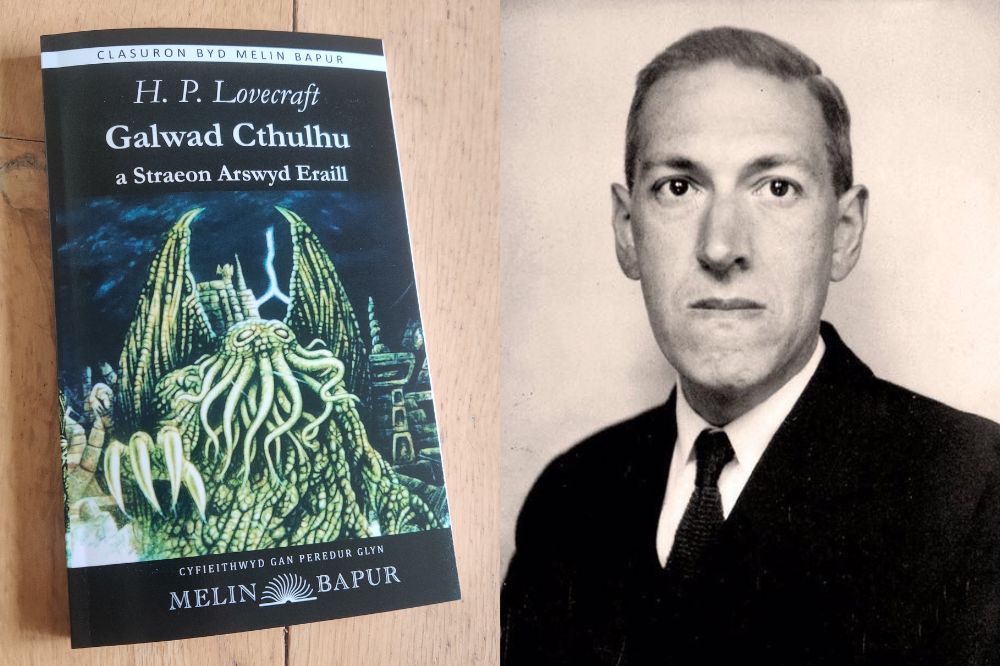 Yr Hobyd. Image: Melin Bapur Books
Yr Hobyd. Image: Melin Bapur Books
Adam Pearce, Editor, Melin Babur Books
Given the obvious power difference between Welsh and English, and our long colonial relationship, is it right or wrong to translate English works into Welsh?
We’ve been extremely pleased with the overall reception we have had since setting up Melin Bapur at the end of 2023 and launching in February 2024.
Dozens of our customers have gone out of their way to give us great feedback and the support we’ve had from Welsh institutions like Radio Cymru and nation.cymru has been great; even better has been the way talented authors and translators like Anna Gruffydd, Mary Burdett-Jones, Ian Parri, Peredur Glyn, Sharon Morgan and Richard Crowe have approached us and paid us the enormous compliment of entrusting us with publishing their work.
Nevertheless I have been fascinated to note the occasional more negative comment we have received as well – nothing genuinely nasty or insulting, thankfully, but some comments specifically arising from our decision to publish Welsh translations of English books like The Hobbit, The Time Machine, The Call of Cthulthu, The Vagina Monologues and the like – these comments have questioned either the value or the appropriateness of such things, and particularly, accusing us of somehow undermining the publication of original literature in Welsh.
It’s a fair question to ask. Given the obvious power difference between Welsh and English, and our long colonial relationship, is it right or wrong to translate English works into Welsh?
Arguments against
Based on the comments we’ve received it seems that the arguments against translation from English, broadly speaking, are that:
1) people will buy and read translations instead of original books by Welsh writers, thereby harming Welsh authors;
2) there’s no point as Welsh speakers generally can read English anyway, so they won’t want to read translations.
Keen observers will note that these two arguments are contradictory: if nobody wants to read them then how can they harm Welsh writers?
Regardless, it’s pretty easy to disprove the second point with the fact that people do buy and read these books. This argument is based on a misunderstanding of why people buy and read books (in Welsh or otherwise), which probably arises from a prejudice against translation as a process and an assumption that reading a text that has been translated is an experience that is on some essential level inferior.
Holes
This is not, however, how most people actually think. Needless to say we don’t know everything about all our customers, but I would be willing to bet that the majority have already read these books in English, especially Yr Hobyd; they want them in Welsh not because they think that a Welsh version will be better (or worse), but because it will provide a different sort of experience. If anything the fact they already know the book is the whole point.
But we’ll come back to that, after addressing the idea that these books threaten or harm original writing in Welsh.
The idea seems to be that readers will choose to buy and read Tolkien or Lovecraft or Eve Ensler instead of Welsh authors; therefore we are hurting them by publishing these books.
 The translated works and H. P. Lovecraft
The translated works and H. P. Lovecraft
This argument might make sense on first glance, but the more you think about it, the more holes appear.
The argument seems to take it for granted that the demand for books in Welsh is some kind of fixed quantity: that buying and reading any one book in Welsh means one doesn’t buy or read another book in Welsh. Publishing, under this assumption, is a zero-sum business.
This might be true of some products, like, say, washing powder: if I buy one brand I don’t need to buy another.
But reading isn’t like that. Even it were, this argument betrays a lack of confidence in the value and appeal of the same original Welsh books it purports to defend.
Do we really think that the only reason people read original Welsh books is that they can’t get translations of the books they really want to read? And that – in order to protect original writing in Welsh – we need to restrict readers’ access to other books in Welsh, in case they might prefer them?
I believe that there is more value to Welsh literature than that!
Opening doors
Of course in reality, Welsh books already have to compete with Tolkien, J. K. Rowling and the rest, regardless of whether or not they’re available in Welsh; just as they compete with the television and social media and Netflix and the gym and everything else people choose to do in their spare time.
In fact Welsh readers already read Tolkien, but before we brought out Yr Hobyd they were doing it in English.
Sure, bring out a new book in Welsh (whatever it is) and it might mean someone doesn’t read another book in Welsh. But it might also mean they read one fewer book in English, or that they spend less time doing something else, and more time reading in Cymraeg. The book Yr Hobyd is probably most likely to push off someone’s reading list is The Hobbit!
(I’ve been accused of Thatcherism for making this argument!)
And this brings us to the point of publishing these books, which is the very real possibility that they are actually bringing people into reading in Welsh who wouldn’t otherwise do it.
Many of our customers have contacted us to say exactly this; many of them are learning Welsh and want the book as an exercise to improve their Welsh (which of course is another great reason why it’s important we have these books).
Younger readers, too, or other fluent speakers who don’t currently read at all in Welsh, but want to, yet don’t feel the current offer in Cymraeg caters for them, or don’t know where to start, or worry that they’ll struggle to understand and want the crutch of a familiar book.
Gateway
Of course there’s no guarantee these people will go on to read another book in Welsh, but even if they don’t, we’ve helped them to read a book in Welsh they would not otherwise have read, which is surely valuable in itself.
If this is just the start, then better still. The other half of our mission with Melin Bapur is to republish the (original) Welsh literature of the past, and to use the translations as a ‘gateway’ into this exciting world.
Perhaps I haven’t convinced you, but that’s ok: you don’t have to buy our translations (no doubt that’s me being Thatcherite again?), but do check out the original Welsh books that represent about three quarters of Melin Bapur’s offer!
It’s possible to overstate the argument, and I don’t wish to be misunderstood: something extremely valuable would be lost if the only Welsh books available were translations.
I want to see original Welsh writers supported too, and this is one of the reasons we don’t compete with the traditional Welsh publishing industry for Books Council grants (which don’t seem to be offered for translations anyway).
But the current situation, where virtually nothing is published in translation for adults, is so far away from this nightmare scenario that it is if anything too far in the opposite direction.
Publishing popular stories are what normal, healthy, living languages do, and our reluctance to do so in Welsh seems to speak more of our own insecurities than anything else.
There is more than enough room in Wales for the occasional Hobyd – after all, they’re famously quite small!
A version of this article in Welsh appeared originally on www.melinbapur.cymru
Support our Nation today
For the price of a cup of coffee a month you can help us create an
independent, not-for-profit, national news service for the people of Wales, by
the people of Wales.

